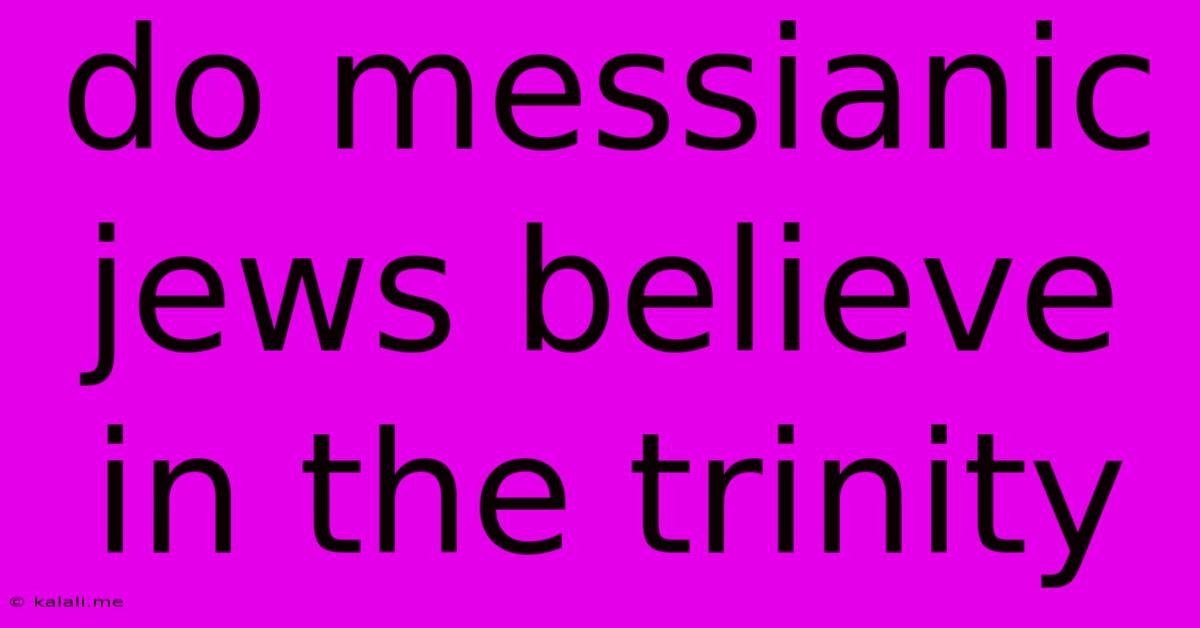Do Messianic Jews Believe In The Trinity
Kalali
Jun 10, 2025 · 3 min read

Table of Contents
Do Messianic Jews Believe in the Trinity? Understanding a Complex Faith
Messianic Judaism, a relatively modern movement, sits at a fascinating intersection of Jewish tradition and Christian belief. This often leads to questions about their core tenets, particularly regarding the Trinity. This article explores the nuanced perspective of Messianic Jews on the nature of God, clarifying common misconceptions and highlighting the key differences between their beliefs and traditional Trinitarian Christianity. Understanding their position requires examining their interpretation of scripture and their unique theological framework.
What is Messianic Judaism?
Before diving into the Trinity question, it's crucial to understand what Messianic Judaism is. It's a movement that identifies as Jewish while accepting Jesus as the Messiah prophesied in the Hebrew Bible. This distinguishes them significantly from both traditional Judaism and mainstream Christianity. They observe Jewish law and traditions, including Sabbath observance, dietary laws (kashrut), and religious holidays, while simultaneously affirming Jesus' divinity and his role as the Son of God. This blend of Jewish practice and Christian belief makes their theological stance on the Trinity particularly complex.
The Trinity: A Christian Doctrine
The Trinity, a central tenet of mainstream Christianity, posits that God is one being existing in three co-equal, co-eternal persons: the Father, the Son (Jesus Christ), and the Holy Spirit. This doctrine is not explicitly stated in the Bible but is derived from various scriptural passages and theological interpretations developed over centuries.
Messianic Jewish Views on God:
Messianic Jews generally do not subscribe to the classical Trinitarian doctrine as understood in traditional Christianity. Their understanding of God is rooted in the Shema, the foundational Jewish declaration of monotheism ("Hear, O Israel: The Lord our God, the Lord is one"). This commitment to the absolute oneness of God (Yahweh) is paramount.
However, their belief in Jesus as the Messiah significantly shapes their understanding of God's nature. They acknowledge Jesus' divine nature and his unique relationship with God the Father, but often avoid explicitly using the term "Trinity." Instead, they may emphasize:
- The Unity of God: Maintaining the absolute oneness of God is crucial. Jesus is seen as the Son of God, but within the framework of God's ultimate unity.
- Jesus as the Messiah: Their belief centers on Jesus' fulfillment of Old Testament prophecies and his role as the promised Messiah.
- The Ruach HaKodesh (Holy Spirit): The Holy Spirit is acknowledged as an active force of God, but its relationship to the Father and Son is understood differently than in the Trinitarian framework.
Key Differences and Nuances:
The crucial difference lies in the emphasis on the relationship within the Godhead. While Trinitarians see three distinct persons within one God, Messianic Jews often emphasize the unity of God, with Jesus' divinity understood within that unity. They might articulate their understanding through metaphors, avoiding rigid definitions that might contradict their commitment to monotheism. This approach often leads to a more nuanced and less rigidly defined theological system than that of traditional Trinitarian Christianity.
Conclusion:
In short, while Messianic Jews believe in Jesus as the Messiah and acknowledge his divine nature and the Holy Spirit's activity, they generally do not adhere to the classical Trinitarian doctrine of three co-equal, co-eternal persons. Their understanding of God's nature remains firmly rooted in Jewish monotheism, emphasizing the absolute unity of God while incorporating their belief in Jesus' unique role within God's plan. This makes their theological position a complex and fascinating area of study, requiring sensitivity and careful understanding of their perspectives.
Latest Posts
Latest Posts
-
Which Of The Following Is Not A Vasoconstrictor
Jun 12, 2025
-
Which Of The Following Is A Conductor Of Electricity
Jun 12, 2025
-
How Do You Spell The Number 90
Jun 12, 2025
-
The Latest Start Of An Activity Is The
Jun 12, 2025
-
Which Is Not Green House Gas
Jun 12, 2025
Related Post
Thank you for visiting our website which covers about Do Messianic Jews Believe In The Trinity . We hope the information provided has been useful to you. Feel free to contact us if you have any questions or need further assistance. See you next time and don't miss to bookmark.